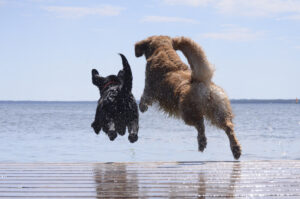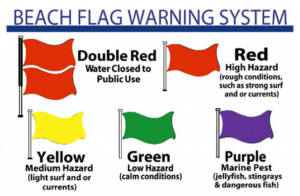
With the temperatures soaring these days, a dip in the water sounds like the perfect solution to a scorching hot day! If you’re not careful, however, a fun day of sun and water could turn into a headache for you and your pets.
The North Carolina Department of Health and Human Services (NCDHHS) is urging individuals to prioritize safety while swimming in recreational waters.
NCDHHS has provided guidelines to help keep you and your pets healthy in the water summer:
Recognize Harmful Algal Blooms: Algal blooms can produce toxins harmful to humans and pets. They often appear as thick, green, blue-green or red scums on the water’s surface or along the shoreline. Avoid contact with affected waters and keep your pets away from these areas as well.
Avoid Suspicious Water Conditions: Be cautious if the water appears discolored, has a strong odor, or contains visible debris. Such conditions may indicate poor water quality or possible bacterial contamination. Choose a different location to ensure a safer water experience for you and your pets.
Water Quality Advisory Updates: Stay informed about water quality advisories or warnings issued by local authorities for recreational waters. These advisories may include alerts about harmful algal blooms or bacteria contamination. Check the latest updates before heading out to enjoy summer water activities here.
Prevent Ingestion: As you enjoy the water this summer, avoid ingesting water and reduce your risk of illness by keeping your mouth closed and holding your nose shut or using a nose clip. Discourage your pets from drinking or ingesting water while swimming to prevent water-borne illness. Carry fresh water for your pets to drink and keep them hydrated throughout your water activities.
Rinse Off After Water Activities: After swimming, rinse yourself and your pets with clean with fresh water to remove any potential bacteria, algae or toxins that may cling to the skin or fur. This simple step can minimize health risks associated with waterborne contaminants.
Monitor for Symptoms: Be attentive to any symptoms in yourself or your pets after water activities, such as skin irritations, gastrointestinal issues, respiratory problems or unusual behavior. If you or your pets exhibit any concerning symptoms, seek medical attention promptly.
For more information and additional resources on water safety, click here.
In addition to these guidelines, if you are headed to the beach, you should always be aware of the warning flag system. Here is what different colors mean:

Always use caution when swimming in the ocean. Many beaches in North Carolina do not have lifeguards on duty so be aware of conditions before swimming. Contact local Chambers of Commerce for more information on beach safety.
